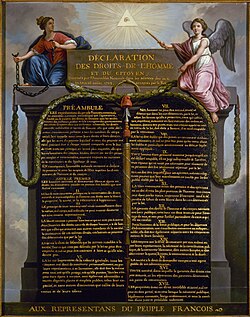Law
France uses a civil legal system, wherein law arises primarily from written statutes;[82] judges are not to make law, but merely to interpret it (though the amount of judicial interpretation in certain areas makes it equivalent to case law in a common law system). Basic principles of the rule of law were laid in the Napoleonic Code (which was largely based on royal law codified under King Louis XIV). In agreement with the principles of the Declaration of the Rights of Man and of the Citizen, the law should only prohibit actions detrimental to society.

French law is divided into two principal areas: private law and public law. Private law includes, in particular, civil law and criminal law. Public law includes, in particular, administrative law and constitutional law. However, in practical terms, French law comprises three principal areas of law: civil law, criminal law, and administrative law. Criminal laws can only address the future and not the past (criminal ex post facto laws are prohibited).[160] While administrative law is often a subcategory of civil law in many countries, it is completely separated in France and each body of law is headed by a specific supreme court: ordinary courts (which handle criminal and civil litigation) are headed by the Court of Cassation and administrative courts are headed by the Council of State. To be applicable, every law must be officially published in the Journal officiel de la République française.[citation needed]
France does not recognise religious law as a motivation for the enactment of prohibitions; it has long abolished blasphemy laws and sodomy laws (the latter in 1791). However, "offences against public decency" (contraires aux bonnes mœurs) or disturbing public order (trouble à l'ordre public) have been used to repress public expressions of homosexuality or street prostitution.[citation needed]
France generally has a positive reputation regarding LGBTQ rights.[161] Since 1999, civil unions for homosexual couples have been permitted, and since 2013, same-sex marriage and LGBT adoption are legal.[162] Some consider hate speech laws in France to be too broad or severe, undermining freedom of speech.[163] France has laws against racism and antisemitism,[164] while the 1990 Gayssot Act prohibits Holocaust denial. In 2024, France became the first nation in the European Union to explicitly protect abortion in its constitution.[165]
Freedom of religion is constitutionally guaranteed by the 1789 Declaration of the Rights of Man and of the Citizen. The 1905 French law on the Separation of the Churches and the State is the basis for laïcité (state secularism): the state does not formally recognise any religion, except in Alsace-Moselle, which continues to subsidize education and clergy of Catholicism, Lutheranism, Calvinism, and Judaism. Nonetheless, France does recognise religious associations. The Parliament has listed many religious movements as dangerous cults since 1995 and has banned wearing conspicuous religious symbols in schools since 2004. In 2010, it banned the wearing of face-covering Islamic veils in public; human rights groups such as Amnesty International and Human Rights Watch described the law as discriminatory towards Muslims.[166][167] However, it is supported by most of the population.[168]
